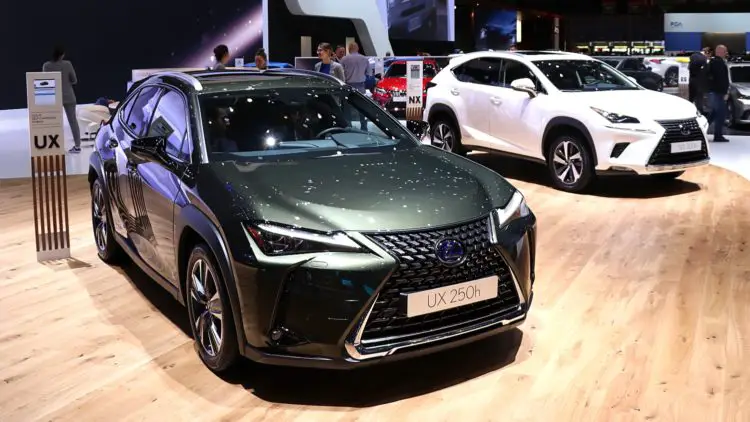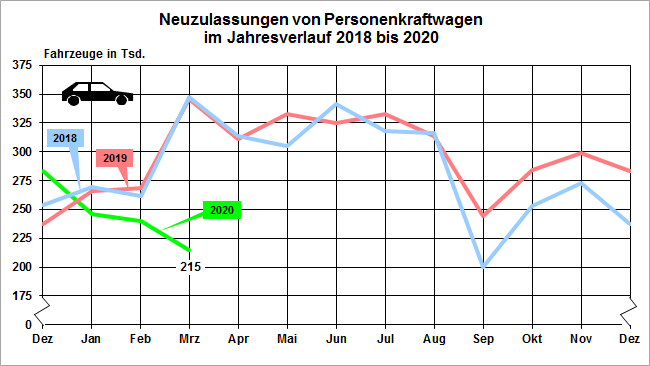Q1/2020: Volkswagen, Mercedes-Benz, and Audi were the best-selling car brands in Germany and the VW Golf the top-selling model.

January to March 2020: New passenger vehicle registrations in Germany contracted by 20% largely due to the Coronavirus closing both salesrooms and registration offices. Volkswagen and Mercedes-Benz remained the top-selling car brands in Germany during the first quarter of 2020 with both marques gaining market share despite lower sales. The VW Golf remained Germany’s favorite car model despite a slow start to deliveries of the new Golf 8 model.
German Car Sales Statistics — 2022: Market Overview, Brands, Models, Electric; 2021: Market, Brands, Models, Electric; 2020: Market, Brands, Models, Electric; 2019: Market, Brands, Models, Electric
German New Car Market in 2020 (Q1)

New passenger vehicle registrations in Germany contracted by 20.3% during the first quarter of 2020 to only 701,382 cars – almost 180,000 fewer than during the first three months of 2019.
The German new car market had a weak start to 2020 with sales down by 7.3% in January and 10.8% in February. However, the German new car market contracted by 37.7% in March, which is usually the most important month for sales, due to the effect of the Coronavirus that hit in the latter part of the month. Showroom and registration office closures happened later in Germany than in neighboring France where car sales in March 2020 were down 72%.
Best-Selling Car Brands in Germany in 2020 (Q1)
The top-selling car marques in Germany according to passenger vehicle registration data released by the KBA were as follows during the first three months of 2020:
| Brand | Q1/2020 | Q1/2019 | % 19/20 | |
| Total | 701,362 | 880,092 | -20.3 | |
| 1 | VW | 133,792 | 163,415 | -18.1 |
| 2 | Mercedes | 69,743 | 77,726 | -10.3 |
| 3 | Audi | 60,142 | 75,615 | -20.5 |
| 4 | BMW | 58,114 | 62,481 | -7.0 |
| 5 | Ford | 47,395 | 67,941 | -30.2 |
| 6 | Skoda | 41,278 | 51,800 | -20.3 |
| 7 | Opel | 37,161 | 56,407 | -34.1 |
| 8 | Seat | 30,693 | 29,769 | 3.1 |
| 9 | Renault | 25,626 | 32,296 | -20.7 |
| 10 | Hyundai | 22,732 | 29,706 | -23.5 |
| 11 | Fiat | 17,557 | 20,486 | -14.3 |
| 12 | Toyota | 16,777 | 20,327 | -17.5 |
| 13 | Kia | 15,019 | 16,291 | -7.8 |
| 14 | Mitsubishi | 12,788 | 14,264 | -10.3 |
| 15 | Peugeot | 12,631 | 18,771 | -32.7 |
| 16 | Citroen | 12,340 | 15,519 | -20.5 |
| 17 | Volvo | 11,366 | 12,122 | -6.2 |
| 18 | Dacia | 10,857 | 18,939 | -42.7 |
| 19 | Nissan | 10,138 | 10,550 | -3.9 |
| 20 | Mazda | 10,089 | 18,076 | -44.2 |
| 21 | Mini | 9,604 | 11,735 | -18.2 |
| 22 | Porsche | 5,687 | 5,497 | 3.5 |
| 23 | Suzuki | 5,362 | 10,586 | -49.3 |
| 24 | Land Rover | 3,703 | 5,167 | -28.3 |
| 25 | Tesla | 3,315 | 3,596 | -7.8 |
| 26 | Jeep | 3,086 | 4,153 | -25.7 |
| 27 | Honda | 2,622 | 4,215 | -37.8 |
| 28 | Jaguar | 2,273 | 2,172 | 4.7 |
| 29 | Smart | 1,444 | 11,097 | -87.0 |
| 30 | Subaru | 1,343 | 1,868 | -28.1 |
| 31 | Lexus | 929 | 618 | 50.3 |
| 32 | DS | 805 | 710 | 13.4 |
| 33 | Alfa Romeo | 660 | 991 | -33.4 |
| 34 | Ssangyong | 377 | 492 | -23.4 |
| 35 | Others | 3,914 | 4,694 | |
| Source: KBA |
Top-Selling Car Brands in Germany in 2020 (Q1)
The shock of the sudden closure of car dealers and registration offices in Germany means that not too much should be read into the relative positions of the various brands. There were anyway no major movements in the relative positions of the car brands during the first quarter of 2020. Only five brands increased sales volumes during the first three months of 2020 in Germany and in March 2020, Subaru was the only brand with higher sales than in March 2019.
Volkswagen easily maintained its position as Germany’s largest carmaker and increased market share by half a percentage point to 19.1%. Mercedes-Benz outperformed the broader market and gained just over a percentage market share to take 9.9% of the German new car market during the first quarter of 2020.
Audi was again the third best-selling car brand in Germany and just underperformed the broader market. BMW gained a rank position and was the best performer of the three so-called premium brands.
Ford slipped on rank position with sales down by 30% while Skoda gained one position with sales down exactly in line with the market. VW-owned Skoda remained the top imported car brand in Germany. Opel slipped one place with the weakest performance of any top-ten brand.
Seat and Renault swapped places with Seat the only top-20 brand with higher volume sales in Germany thus far this year. Renault remained the top-selling foreign brand with no direct German ownership of manufacturing tradition. Hyundai again rounded out the top ten list.
The most-improved car brands in Germany thus far in 2020 were Lexus, DS, Jaguar, Porsche, and Seat. In the case of Porsche more a reflection of its dismal performance at the start of 2019 than any true sales gains this year.
The worst-performing car brand by far this far in 2020 in Germany was Smart that is still in the process of switching over to electric cars only. Suzuki, Mazda, and Dacia also had sales down by more than 40%
Top-Ten Best-Selling Car Models in Germany in 2020 (Q1)
According to passenger vehicle registration statistics released by the KBA, the following were the ten most-popular car models in Germany during the first quarter of 2020:
| Model | Q1/2020 | Q1/2019 | |
| 1 | VW Golf | 35,878 | 50,895 |
| 2 | VW Tiguan | 16,620 | 20,709 |
| 3 | VW Passat | 16,244 | 12,688 |
| 4 | Ford Focus | 15,322 | 16,148 |
| 5 | BMW 3-Series | 13,155 | 8,649 |
| 6 | VW Polo | 12,019 | 18,556 |
| 7 | Audi A4 | 11,785 | 13,149 |
| 8 | Skoda Octavia | 10,733 | 14,764 |
| 9 | Opel Corsa | 10,671 | 11,950 |
| 10 | VW T-Roc | 10,585 | 15,500 |
| 10.5 | Source: KBA |
Best-Selling Car Models in Germany in 2020 (First Quarter)
Despite a slow start to deliveries due to production problems with the new Golf 8, the VW Golf easily remained the top-selling car in Germany, although it lost the crown as Europe’s best-selling car narrowly to the Renault Clio in February 2020. The eGolf was also the top-selling electric car model in Germany thus far in 2020.
The VW Tiguan maintained its second place from a year ago and it was again Germany’s favorite SUV, although officially it counts as a Geländewagen (cross-country vehicle).
The VW Passat returned to third place from tenth a year and actually increased the number of cars sold. This is generally good news for Volkswagen’s bottom line – nearly all Passats are bought by businesses and the car is known to be a very good earner for the company.
The Ford Focus was again the fourth most popular car in Germany during the first quarter of the year. Sales were only marginally lower than a year ago.
All the other cars in the top ten had different rank positions from a year ago. The BMW 3-Series returned to the top ten with sales strongly up. The BMW was helped by a recent model update.
In contrast, the VW Polo slipped for third to sixth — the Polo also struggled in some other European markets this year.
The Audi A4 improved two positions while the Skoda Octavia slipped one. The Octavia remained Germany’s favorite imported car model.
The Opel Corsa returned to the top ten in Germany. The new Corsa, based on the Peugeot 208, was generally well received.
The VW T-Roc slipped from sixth to tenth. The T-Roc was the most popular SUV model using the official German definition. It received strong competition from other brands but also in-house from the smaller T-Cross.
The Mercedes-Benz C-Class dropped from fifth to 11th. The Audi A3 also slipped out of the top ten but should be help later in the year by a model change.
